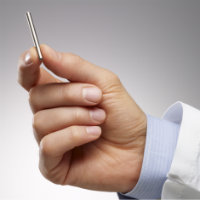 |
| Intarcia's ITCA 650 is a subcutaneous implant that administers exenatide.--Courtesy of Intarcia |
Just a few weeks after claiming success with a pair of late-stage studies of its prolonged dosing approach to diabetes, Boston-based Intarcia has followed up with a billion dollar-plus sized commercialization deal for ex-U.S. and Japan commercial rights with France's Servier.
Drawn by Intarcia's potentially disruptive approach--implanting a miniature pump to provide even dosing of a newly formulated version of exenatide to control blood sugar levels for up to a year--Servier is handing over a hefty $171 million upfront payment while promising three "early stage" regulatory milestones worth $230 million and up to $650 million in accumulated development and sales milestones.
Back with a whopping $200 million in fresh investor backing last spring, Intarcia has been able to go it alone until now in a field dominated by giants with very deep pockets. The cost of late-stage development in a field where regulators demand big patient populations and detailed safety data for any therapy targeted at a patient population counted in the millions has made this a tough area for small biotechs to play in.
Intarcia execs told FierceBiotech earlier that a range of diabetes companies have been interested in licensing this technology, but notably none of the dominant companies like Sanofi ($SNY), Novo Nordisk ($NVO), Merck ($MRK) or Eli Lilly ($LLY) bought in to Intarcia's technology. And this is a very competitive field when it comes to new approaches to treating diabetes.
The biotech has been betting that a new drug/device combo like this could provide something a large number of diabetics can't provide for themselves: a consistently lower blood sugar level without any threatening gyrations. Consistent self-dosing has remained an elusive goal for many, potentially offering a GLP-1 device/drug like this a major opportunity.
Intarcia's biggest challenge lies ahead. The company is engaged in a head-to-head study with Merck's DPP-4 drug Januvia. In two other Phase III trials investigators said ITCA 650 beat out a placebo in lowering blood sugar levels and also pushed 25% of patients with blood glucose levels over 10% under the all-important 7% threshold.
Intarcia, meanwhile, says it couldn't be happier with its partner. And it insists that in this case, smaller is better.
"We are already the highest valued private biotech company in history with world-class investors, and now we are firmly set up to retain full control of the U.S. operations as we continue on our path to build a fully capable and disruptively innovative biotech company with a pipeline of game changing, once-yearly medicines," boasted Intarcia CEO Kurt Graves in a statement. "We are very pleased to partner with Servier, who shares our passion and vision for ITCA 650, and the goal of leveraging our technologies to open up a totally new way of delivering important GLP-1 therapy to patients with type 2 diabetes. Truly disruptive technologies and products tend to come from smaller, faster, more flexible, and more innovative companies not tied to the business models of the largest pharmaceutical firms. Servier brings a unique combination of financial strength, deep diabetes expertise with no competitive conflicts, and a track record of innovation and excellent performance in the EU and emerging markets. We placed high value on those factors and their partnering mindset when we made our final decision to select Servier over other major diabetes firms competing for months to be our partner."
- here's the release
Special Reports: What's next in diabetes drugs? The pulse of R&D at ADA14 | FierceBiotech's 2007 Fierce 15 - Intarcia Therapeutics